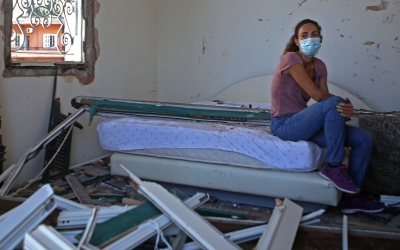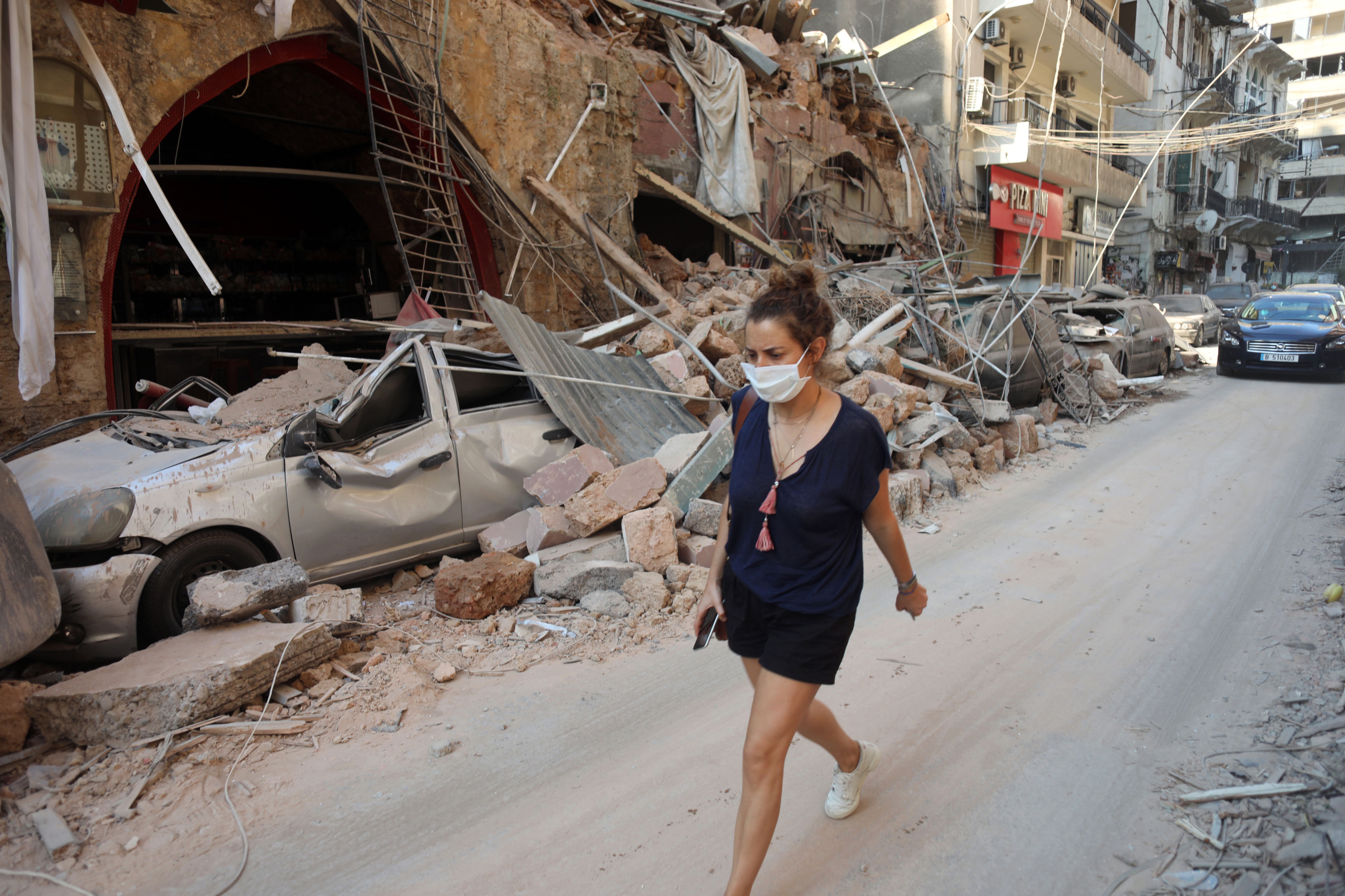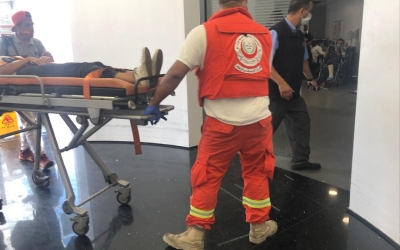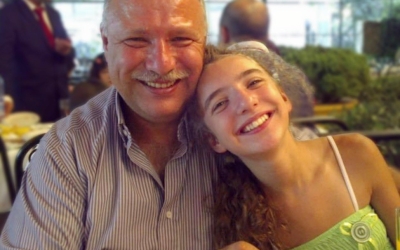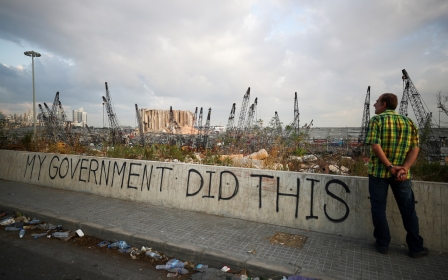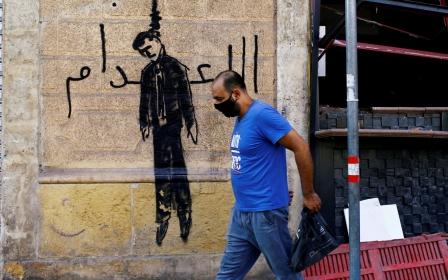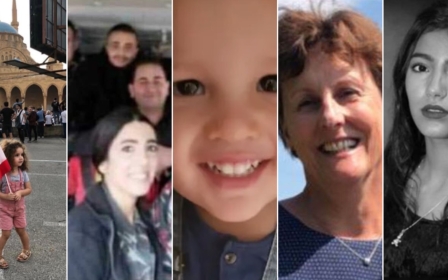Beirut blast: Coronavirus cases surge in Lebanon in aftermath of explosion
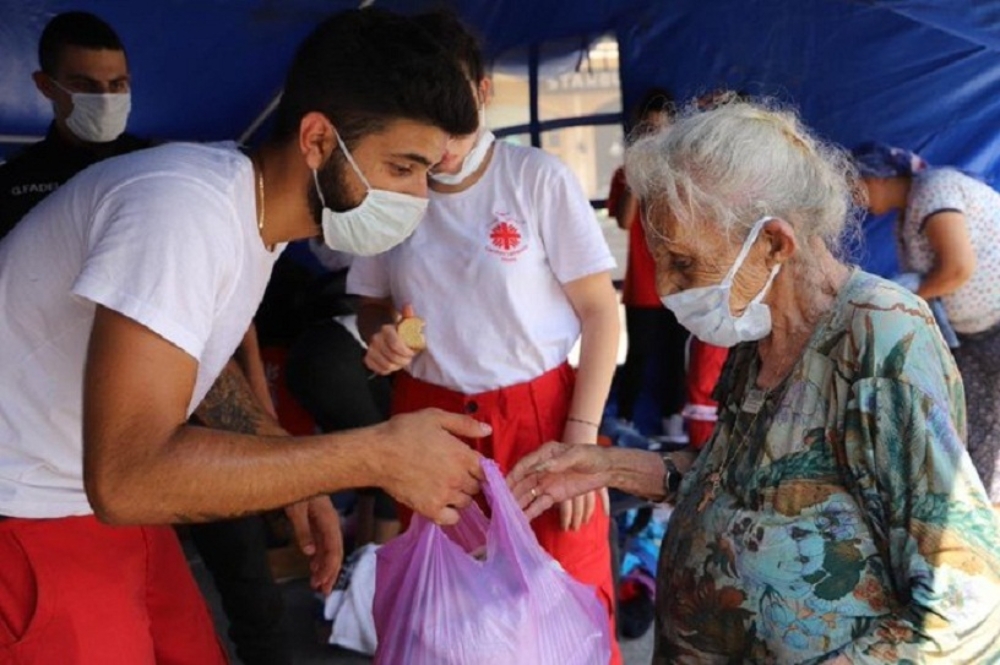
The morning after the 4 August explosion at Beirut's port, 25-year-old Joumana was on the ground with other volunteers helping with relief efforts. A resident of Beirut, she comforted survivors, swept broken glass from the streets and joined the protests that ensued.
Two weeks after the blast, she tested positive for Covid-19.
New MEE newsletter: Jerusalem Dispatch
Sign up to get the latest insights and analysis on Israel-Palestine, alongside Turkey Unpacked and other MEE newsletters
"I felt a mild sore throat but assumed it was irritation from the tear gas at the protests," she told Middle East Eye. "When other symptoms appeared, I isolated and got tested."
There is no good time for 2,750 tonnes of ammonium nitrate to explode in the heart of a capital city, but for a country already struggling amid an economic meltdown and a pandemic, it's hard to imagine worse timing.
The link between the chaotic aftermath of the Beirut blast and the surge in coronavirus cases in Lebanon remains unassessed. But nearly three weeks after the explosion, the country is witnessing record numbers of confirmed cases of Covid-19, which have crossed 600 cases reported daily.
Relative to the country's population, that is equivalent to 6,000 daily cases in the United Kingdom, according to Dr Firass Abiad, manager of Rafik Hariri University Hospital, the main public facility in Beirut managing the coronavirus response.
"More than 10 percent of tests are coming back positive," he said. "According to the WHO [World Health Organisation], anything above 5 percent is worrying."
According to the Lebanese Information Ministry, the number of coronavirus-related deaths in the country stood at 121 on Sunday.
The country's already struggling healthcare system, compounded by the impact of the blast, paints a bleak picture of Lebanon's ability to fight the pandemic, and a two-and-a-half week partial lockdown that began this week has done little to assuage fears in the country.
Cases on the rise
In the chaos that overwhelmed Beirut in the immediate aftermath of the explosion, coronavirus precautions and social distancing measures were overshadowed by the extent of the human devastation: 178 people dead, 6,000 wounded, 30 still missing and some 300,000 homeless.
The day of the blast was the first after a four-day lockdown was lifted, with another four-day lockdown scheduled to begin on 7 August. The second lockdown was later retracted by Interior Minister Mohamad Fahmi given the scale of the devastation.
Concerns of a surge in coronavirus cases took the back seat as people rushed to pull survivors from the rubble or carry them to hospitals in and out of Beirut. Doctors report upholding their medical precautions despite the panic, but the number of patients was simply too overwhelming.
At Hotel Dieu Hospital, the emergency room was so packed that many of the injured had to be treated on reception desks, or even outside.
At Geitaoui Hospital, the hospital's quality manager, Antoine Saab, reported similar circumstances.
"Even though the hospital was hit, we received more than 200 wounded," he told MEE. "I suppose that night was high risk. We were worried about breaches, but we were still monitoring and screening."
The day after the blast, young volunteers rushed to Beirut from around the country to help with cleaning and relief efforts, filling in for the absence of any government-led relief effort on the street.
"If there had been any kind of emergency response by the state after the blast," Joumana said, "if we didn't have to clean the streets and take people to hospitals ourselves, if we didn't have to scream, swear and cry at protests, if we didn't have to cough up the tear gas of this brutal regime, maybe we wouldn't be facing such a serious wave of Covid-19."
A damaged healthcare system
Even before the devastation of the explosion, the situation was worrying for Lebanon's already strained healthcare system.
'If there had been any kind of emergency response by the state after the bomb... maybe we wouldn't be facing such a serious wave of Covid-19'
- Joumana, activist and volunteer
Since February, hospitals and medical staff have been responding to the pandemic, amid the challenges caused by Lebanon's economic collapse. With a currency crash affecting imports, medical professionals have reported shortages in necessary medical equipment and safety vests, as well as delays in salaries.
Private hospitals represent 80 percent of the healthcare sector in Lebanon, but not all of them have been taking in Covid-19 patients. Meanwhile, public hospitals, such as Rafik Hariri Hospital, are operating at high occupancy, taking in additional coronavirus cases even as the number of available intensive care units (ICUs), ventilators, and trained staff members falters.
Before the explosion, Saint George Hospital in east Beirut contained a 10-bed Covid-19 ICU as well as a 20-bed ward for patients in recovery. Meanwhile, the neighbouring Geitaoui Hospital has an even smaller Covid-19 unit, with 6 ICU beds and a 15-bed ward, which was full when the explosion happened.
After 4 August, however, four hospitals in Beirut are either totally or partially out of service due to damage incurred in the explosion.
Saint George was 80 percent damaged, and had to evacuate 800 patients during the chaos overnight on 4 August. Five of its Covid-19 patients were transferred to Rafik Hariri University Hospital. One of them died on the way.
Geitaoui Hospital also had to evacuate all its patients that night, and remains almost entirely closed. "The first assessment estimates $10m to $12m in damages," Saab told MEE. "Now we're reaching out to local and international donors and NGOs who can help us rebuild."
Rosaire Hospital and Karantina state hospital also had to shut down in the aftermath of the blast.
Asked about the present total bed capacity in the country, Abiad said: "We need to know more about the situation of hospital beds in the private sector. Right now, it's like an army going to war with 20 percent of its soldiers."
Many hospital beds in the capital are still accommodating those wounded on 4 August, according to Abiad. Hotel Dieu Hospital's emergency room, where the biggest number of victims were taken to after the blast, received 500 patients in the hours after the explosion. Fifty of them needed critical operations and 13 were announced dead on arrival, said ER chief Dr Antoine Zoghbi.
On 8 August, another wave of casualties was rushed to hospitals following a protest in Beirut's central district, where demonstrators gathered to demand accountability for the tragedy at the port.
Armed forces used tear gas, rubber bullets, and even birdshot to deter protesters. The total number of injuries exceeded 230, including doctors providing first aid, according to Amnesty International.
After months of treating Covid-19 patients, then weeks of treating injuries from the explosion at the port, hospitals are now reporting shortages of medical equipment, raising concerns about how well they will be able to handle the rise in coronavirus cases.
Lockdown amid devastation
With the number of cases on the rise, the Interior Ministry announced on 18 August yet another partial lockdown, which began on Friday and is set to end on 7 September. Most businesses, gathering spots, private and public spaces are shut down, and a daily curfew is being imposed between 6pm and 6am.
The measures nonetheless exclude relief work in the vicinity of the blast.
Though many have praised the decision as necessary, others are sceptical, wary that the lockdown is a pretext to try and tamp down public anger in the wake of the tragedy.
"The approach of the government since the start of the Covid-19 pandemic has been a repressive approach," said Karim Nammour, a lawyer, researcher, and board member of NGO Legal Agenda.
"The lockdown aims to suppress and subdue the popular uprising," Nammour said. "Fear is a strong and dangerous political tool that was used earlier in the pandemic, and it's being used after the explosion."
Back in April, under the guise of public safety amid the pandemic, security forces had destroyed sit-in tents that had been erected in Beirut's Martyrs' Square since the beginning of the October uprising.
One of the first measures implemented by the government after the Beirut explosion was to announce a state of emergency in Beirut. A few days later, parliament voted on the law, handing the army exceptional authority and full command of all armed forces, including the police, in the capital.
The state of emergency was recently renewed until 7 September, in a move Legal Agenda and other legal experts have deemed unconstitutional.
The nationwide partial lockdown measures for the pandemic are separate from the state of emergency law, which is limited to Beirut.
'People can question measures, but they need to make decisions in the interest of their personal safety and that of the community'
- Dr Firass Abiad, Rafik Hariri University Hospital
For Nammour, the government could have adopted different lockdown measures less damaging to the economy and individuals by basing them on the Infectious Disease Law of 1957 and the General Mobilisation Decree.
Such existing legislation "allows the government to forcefully use empty buildings and hotels to isolate infected people and their contacts," he said. "They also allow the state to isolate areas or regions without having to close off the country. It's more complicated to manage, but more sustainable."
Though the government has implemented some localised measures, its approach has more generally veered towards quicker policies such as the curfew, which Nammour describes as "repressive and completely illegal".
A week after the blast, Prime Minister Hassan Diab announced the resignation of his cabinet, as protesters outside Parliament Square and the government palace in Beirut were showered with tear gas and rubber bullets. Demonstrators set up guillotines in Martyrs' Square with pictures of political leaders hanging. "Justice for the victims, revenge against the regime," their banners read.
As trust in the state falters, many have expressed doubts regarding the coronavirus numbers that come out of state medical institutions. But asked whether the government's response could be serving political interests, Abiad slammed the idea as a conspiracy.
"We need to hold the government accountable," he said. "But the numbers are there, and we know them from the tests. They are very clear."
According to Abiad, a partial lockdown - granted it doesn't interfere with relief and reconstruction efforts in Beirut - is necessary to control the spread of the virus.
"No one benefits from the spread of Covid-19," he said. "This is a personal and community safety issue that has nothing to do with whether people support the government or not. People can question measures, but they need to make decisions in the interest of their personal safety and that of the community."
Unfortunately, the pandemic is far from the only threat to the safety of people living in Lebanon.
Lebanese banks continue to withhold account holders' deposits, the country's currency is still falling, local businesses are still struggling to get by, electricity is scarce and basic food and medicine have disappeared off the shelves.
As almost half of the country is under the poverty line and 23 percent of the population slips into extreme poverty, according to a study by the UN's Economic and Social Commission for Western Asia, many have lost jobs, let alone having the possibility of working from home.
Equally as important, the hundreds of thousands of people who lived through the trauma of 4 August feel that they need to be with one another.
"I always took precautions," Joumana, the young activist, said. "But after the explosion, we hugged people because we were happy they were alive. We had to carry injured people to safety.
"Now they're asking people to stay home, but tell that to the 300,000 people who used to live near the port. These people no longer have a home to stay in."
Middle East Eye delivers independent and unrivalled coverage and analysis of the Middle East, North Africa and beyond. To learn more about republishing this content and the associated fees, please fill out this form. More about MEE can be found here.


